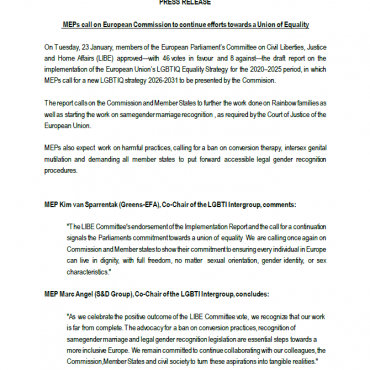Malta adopts ground-breaking gender identity, gender expression and sex characteristics law
Yesterday, Maltese parliamentarians wrote history by adopting the Gender Identity, Gender Expression and Sex Characteristics Act (GIGESC). The law is a major step forward for trans and intersex persons in Malta, and shows the way forward for Europe.
The law introduces the right for individuals to determine their gender identity, without first having to undergo medical tests, forced sterilisation, a forced divorce or a mental health diagnosis. A simple declaration based on self-determination before a notary is sufficient.
11 EU Member States still require sterilisation for legal gender recognition. 4 EU countries do not offer the possibility to change the registered gender at all.
The law also introduces the right to bodily integrity and physical autonomy for all persons. This includes that so called ‘normalizing’ surgeries on intersex babies is prohibited and that non-medically necessary treatment on the sex characteristics of a person without informed consent is unlawful.
Genital “normalization” surgery of intersex infants is widespread, despite not being medically necessary.
Furthermore, the possibility for parents to postpone the entry of a gender marker on the child’s birth certificate exists, until the child’s gender identity is determined. This allows time for an informed decision.
Maltese Member of the Intergroup on LGBTI Rights, Miriam Dalli MEP, reacted: “I am very proud to be from a country that has from now on the most comprehensive and respectful laws when it comes to the rights of trans and intersex people.”
“No one should be declared mentally ill, undergo forced surgery or being forced to go through a divorce, in order to be recognised as who they truly are. I sincerely hope that the whole of Europe will follow Malta’s example, and that such degrading practices will be issues of the past.”
Sirpa Pietikainen MEP, Vice-President of the Intergroup on LGBTI Rights, added: “It is impressive how thoughtful and comprehensive this law was drafted. It includes all important aspects for trans and intersex persons, based on self-determination and autonomy: from recognition, to legal procedures, to inclusion in existing non-discrimination laws.”
“I’m also glad to see governing and opposition parties agreed on the final bill, resulting in a unanimous vote for this landmark Act.”






